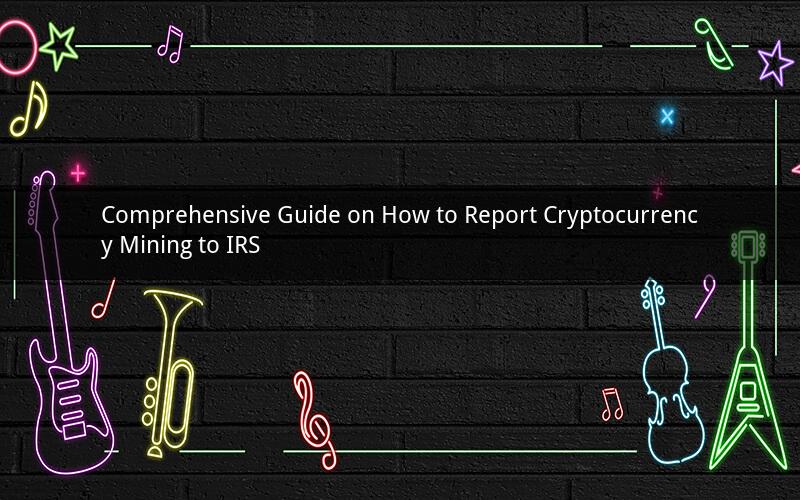
Introduction:
Cryptocurrency mining has gained significant popularity in recent years, with many individuals and entities engaging in this activity. However, it is crucial to understand that mining cryptocurrencies is subject to taxation. The IRS requires individuals and businesses to report their cryptocurrency mining activities accurately. This guide will provide a detailed explanation on how to report cryptocurrency mining to the IRS.
1. Understanding Cryptocurrency Mining and Taxation
1.1 What is Cryptocurrency Mining?
Cryptocurrency mining refers to the process of validating and adding new transactions to a blockchain. Miners use powerful computers to solve complex mathematical problems, which rewards them with cryptocurrency. This process ensures the security and integrity of the blockchain network.
1.2 Tax Implications of Cryptocurrency Mining
The IRS treats cryptocurrency mining as self-employment income. Therefore, miners are required to report their mining income and pay taxes accordingly. The tax treatment of cryptocurrency mining can be summarized as follows:
- Miners must report their mining income as gross income on their tax returns.
- Mining income is subject to income tax, self-employment tax, and potentially other taxes depending on the circumstances.
2. Reporting Cryptocurrency Mining to IRS
2.1 Determining Mining Income
To report cryptocurrency mining to the IRS, you need to determine your mining income. This involves calculating the value of the cryptocurrency you have mined during the tax year. The value can be determined by referencing the market rates of the cryptocurrency at the time of mining.
2.2 Form 1040
Report your mining income on Form 1040, the U.S. Individual Income Tax Return. You will need to fill out Schedule C (Form 1040), which is used to report income or loss from a business you operated or a profession you practiced as a sole proprietor.
2.3 Reporting Mining Expenses
In addition to reporting your mining income, you may also be able to deduct certain expenses related to your mining activities. Common deductible expenses include:
- Hardware and software costs
- Electricity and cooling expenses
- Internet connection fees
- Maintenance and repair costs
To deduct these expenses, you will need to keep detailed records of your expenses and ensure that they are directly related to your mining activities.
2.4 Form 8829
If you incurred significant depreciation expenses on your mining equipment, you may need to complete Form 8829, which is used to report depreciation, amortization, or depletion deductions. This form is applicable if your total depreciation, amortization, or depletion deductions exceed a certain threshold.
3. Reporting Mining Income for Businesses
If you are a business engaged in cryptocurrency mining, the process of reporting your mining income to the IRS is similar to that for individuals. However, there are some additional considerations:
3.1 Form 1120
Businesses report their mining income on Form 1120, the U.S. Corporation Income Tax Return. You will need to fill out Schedule M-1, which is used to reconcile the income reported on your financial statements with the income reported on your tax return.
3.2 Depreciation and Amortization
Businesses can also deduct depreciation and amortization expenses on their mining equipment. The depreciation method and useful life of the equipment will depend on the specific tax regulations applicable to your business.
4. Record Keeping and Documentation
Proper record-keeping is essential when reporting cryptocurrency mining to the IRS. Here are some key aspects to consider:
4.1 Transaction Records
Keep detailed records of all cryptocurrency transactions, including mining rewards, sales, and exchanges. This will help you accurately determine your mining income and track your expenses.
4.2 Expense Documentation
Maintain receipts, invoices, and other documentation for all mining-related expenses. This will be necessary to substantiate your deductions during an IRS audit.
4.3 Tax Preparation Software
Consider using tax preparation software that supports cryptocurrency mining. These software programs can help you accurately calculate your mining income, report deductions, and generate the necessary tax forms.
5. Common Questions and Answers
Question 1: Can I deduct the cost of electricity used for cryptocurrency mining?
Answer: Yes, you can deduct the cost of electricity used for cryptocurrency mining as a business expense. However, the deduction may be subject to limitations based on the specific circumstances of your mining operation.
Question 2: How do I determine the value of cryptocurrency I have mined?
Answer: The value of cryptocurrency you have mined can be determined by referencing the market rates of the cryptocurrency at the time of mining. You can use cryptocurrency exchanges or market data platforms to obtain the accurate value.
Question 3: Can I deduct depreciation on my mining equipment?
Answer: Yes, you can deduct depreciation on your mining equipment. The specific depreciation method and useful life will depend on the tax regulations applicable to your business.
Question 4: Do I need to report cryptocurrency mining income if I lost money?
Answer: Yes, you are still required to report your cryptocurrency mining income, even if you incurred a loss. However, you may be able to deduct the loss on your tax return.
Question 5: Can I deduct the cost of software used for cryptocurrency mining?
Answer: Yes, you can deduct the cost of software used for cryptocurrency mining as a business expense. However, you must ensure that the software is directly related to your mining activities.
Conclusion:
Reporting cryptocurrency mining to the IRS is essential for compliance with tax regulations. By understanding the tax implications of mining, accurately determining your mining income, and properly reporting your expenses, you can ensure compliance while maximizing your tax benefits. Remember to maintain detailed records and seek professional tax advice if needed.